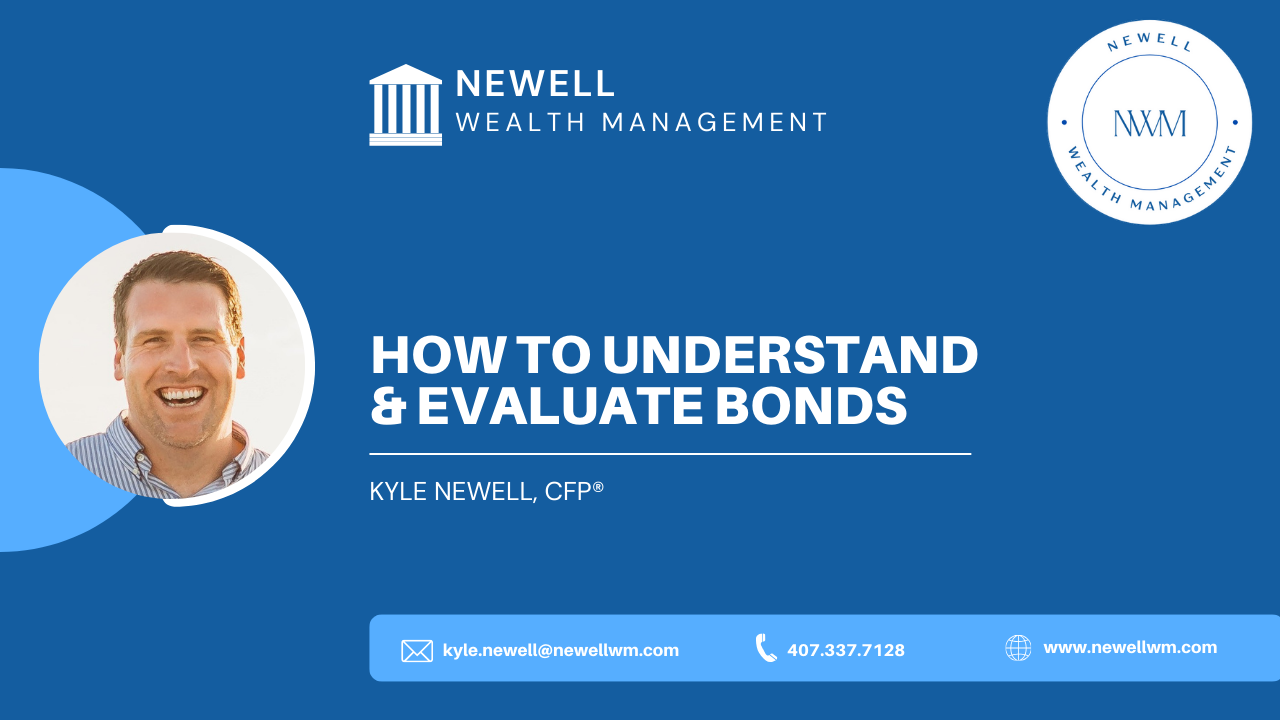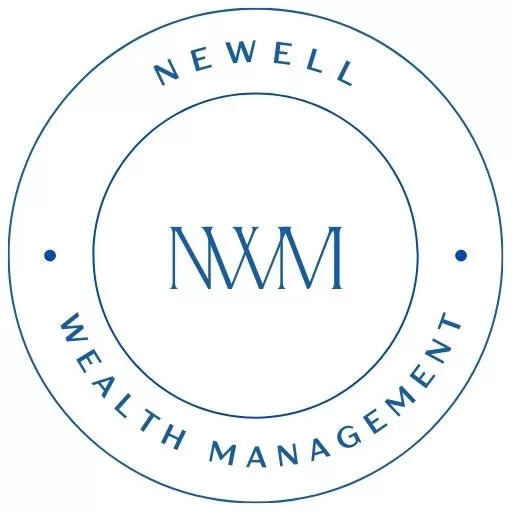How to Understand & Evaluate Bonds

Investing has all sorts of options and almost endless ways of making money within investing. A significant component of investing is bonds.
Many people have heard the term “bonds,” but I find a lot of confusion in the average investor. Bonds aren’t well understood by the average person still working but planning for retirement.
The lack of understanding is partially because the media covers bonds less than stocks. There has been an uptick in bond coverage with the Federal interest rate hikes. Still, in general, many people need help understanding what bonds are, how they work, or how to use them in a portfolio.
I’ve compiled a few fundamental points to help you understand bonds and how to use them in your investment strategy. Let’s start at the beginning.

What is a Bond?
A bond is a form of investment security. When you buy a bond, you loan money to a government or corporation. There are also terms associated with bonds.
The term has a set timeframe, typically five or ten years. When you buy the bond, you loan the government or corporation the money for the specified period. They pay an interest rate along the way. At the end of the term, you receive your money back.
How Does a Bond Work?
Let’s say a company wants to build a building, and it will cost them more money than they have in cash or more than the bank can loan them. They can create a bond offering, which is basically the terms of a loan agreement. Rather than borrowing the money from one bank, they open it up to investors across the globe, which could be a few or a million people.
Bonds are often issued in $1000 increments. People may buy one for $1,000 or $10,000 worth of bonds. Pensions and foundations are significant purchasers of bonds because they have to be pretty conservative in their investment approach. A stated interest rate on bonds makes them attractive to those types of investors.
The company or government raises money through a bond offering. As an investor holding a bond, you have a contract with them for the specified term. The contract specifies your bond’s term length, interest rate, and getting your money back.
If the bond is with a company, it’s only as good as the company’s ability to pay, which is something to think about.
What Are the Potential Returns With Bonds?
The simple answer is the interest rate you signed up for when purchasing the bond. Interest rates have improved quite a bit in 2023. Depending on the day, the 10-year Treasury yield is around 4% to 4.25%. This has caused overall interest rates to be much higher, which is excellent.
Returns were much smaller on bonds from 2018, 2020, and 2021 because interest rates were at a lower interest rate environment. With a new issue bond, the only calculation you need to understand is the interest rate they’re paying you for the timeframe.
There is a secondary bond market. When someone has a bond they no longer want, they sell it in the open market. They may need cash or want to buy a different investment. Depending on the interest rate, the company, risk, etc., these bonds could either be at a premium or a discount of what it was initially.
A discounted bond could go into your potential returns. If the bond was issued at $1,000 and now it’s worth $990 due to the market conditions. Buying it below the original offering means you will have some appreciation and the interest paid along the way.
There can be decent returns on bonds. Historically, bonds have had lower returns than stocks, hence why the media covers stocks more frequently. The reason for lower returns is that bonds take the risk out of investing when it comes to market volatility. Remember, when you own a bond, as long as the company stays solvent, you get your money back at the end of the period.
You’re not only able to loan money to companies through bonds. You can also purchase bonds from the US Government or local city and state governments, known as municipal bonds. On average, these returns are not as strong as other investment classes, but their bonds are also not as volatile.
What Are the Risks of Investing With Bonds?
The interest rate environment heavily impacts bonds. If interest rates go up, bond prices will go down. That will only sometimes happen because it’s a little more involved. But, if interest rates are going up, a bond issued today will pay a higher interest rate than the bond issued three years ago.
If someone wants to sell a bond issued three years ago, they’ll have to discount the price value to be competitive with what buyers can earn on current bonds. That’s why we have an inverse relationship between interest rates and prices. This played out heavily in 2022, one of the worst bond years since the 1600s.
The other risk with a bond is that it’s guaranteed by the issuer offering it. The company must still exist at the end of the term to get your money back. While there are companies and governments with solid balance sheets, many don’t. There is a genuine risk of loss of principal in bonds if the bond issuer goes bankrupt or cannot pay.
While those are the two primary risks with bonds, others, like reinvestment risk, also exist. If you bought a bond and interest rates have lowered when it matures, you’ll receive a lower interest rate than if you purchased a longer-term bond.
How To Evaluate Which Bonds to Buy?
There are several different metrics to consider. We primarily look at
- Who is the issuer?
- What’s their creditworthiness?
- How much risk are you willing to take as an investor?
Do you want to lean on or use only high-quality governments and companies to mitigate the risks of your loan going defunct? Or, are you trying to get a higher yield, so you’re willing to take on some risk that the bond(s) you’re investing in might go out of business?
Understanding the creditworthiness of the issuer is essential. It’s also vital to understand your needs as an investor.
- Is there a specific timeframe when you need that money?
- Is there a certain income that you’re trying to get?
- Are there tax ramifications?
Municipal bonds have the potential to pay tax-free income, whereas a corporate bond will be taxed at ordinary income. Tax ramifications may impact which way to go with your bond investing.
We will also evaluate your ability to diversify your portfolio. I don’t advise having just one bond in your investment portfolio. Having different bonds helps mitigate some of the risks associated with just one bond.
How Do I Apply This Information?
Now that you understand what bonds are, how they work, potential risks and returns, and how to evaluate them, you may wonder how to apply this knowledge to your investing.
The answer is that it goes back to your situation.
- What’s your financial situation?
- What are you trying to accomplish?
- When do you need the money?
- What’s your ideal rate of return to meet your goals and objectives?
Once you know your starting point and what you want to achieve, you can begin to look at your investment strategy.
- What type of accounts are you investing in?
- Are they non-retirement or retirement accounts that may have some impact?
- What does the rest of your portfolio look like?
- Do you want to invest solely in bonds?
- Are there other assets in your portfolio like US or International stocks, mutual funds, ETFs, annuities, etc?
Bonds play a role within the larger portfolio. Consider not owning just one bond because the risk with only one is that it could go bankrupt. You could access a mutual fund or exchange-traded fund bonds. The risk with those is that you can potentially lose your maturity date.
Having a maturity date is one of the main benefits of a bond. Trading the benefit of a specific maturity date, which reduces the expected volatility of the bond, gives you greater diversification where the risk of one of those bonds going bankrupt is mitigated. If it goes bankrupt, it will hurt your overall portfolio less than it would if you own the individual bond yourself.
To Sum It Up
As you can see, there is much to think about when considering bonds in a portfolio. Bonds are a loan to a company or government that pay you interest over a specified amount of time.
There are always risks with investing. Bonds are no exception. Companies and sometimes governments can collapse, taking your money with them. Interest rates can fluctuate, lowering your return.
Evaluate bonds by looking at your financial goals, the creditworthiness of the company, and your risk aversion level. Before making decisions, seek the advice of an expert.
If you would like guidance from an experienced financial planner, I’m happy to help.
We can meet virtually or in person if you live in the Central Florida area. Please email me at kyle.newell@newellwm.com, call/text at 407.337.7128, or schedule a meeting at Schedule – Newell Wealth Management (newellwm.com)
Important Information
Newell Wealth Management, LLC (“NWM”) is a registered investment advisor offering advisory services in the State of FL and in other jurisdictions where exempted. Registration does not imply a certain level of skill or training. The presence of this website on the Internet shall not be directly or indirectly interpreted as a solicitation of investment advisory services to persons of another jurisdiction unless otherwise permitted by statute. Follow-up or individualized responses to consumers in a particular state by NWM in the rendering of personalized investment advice for compensation shall not be made without our first complying with jurisdiction requirements or pursuant to an applicable state exemption.
All written content on this site is for information purposes only and is not intended to provide specific advice or recommendations for any individual. Opinions expressed herein are solely those of NWM, unless otherwise specifically cited. Kyle Newell and NWM are neither an attorney nor an accountant, and no portion of this website content should be interpreted as legal, accounting or tax advice. Material presented is believed to be from reliable sources, and no representations are made by our firm as to other parties’ informational accuracy or completeness. There is no assurance that the views or strategies discussed are suitable for all investors or will yield positive outcomes. Investment involves risks including possible loss of principal and, unless otherwise stated, are not guaranteed. Any economic forecasts set forth may not develop as predicted and are subject to change. All information or ideas provided should be discussed in detail with an advisor, accountant or legal counsel prior to implementation.
